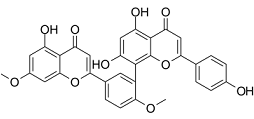All AbMole products are for research use only, cannot be used for human consumption.

Ginkgetin is a natural biflavonoid isolated from leaves of Ginkgo biloba L. with effects of anti-inflammation and anticancer activity. Ginkgetin inhibits COX-2 dependent phases of prostaglandin D(2) (PGD(2)) generation in bone marrow-derived mast cells (BMMC) in a concentration-dependent manner with IC(50) values of 0.75 microM. Ginkgetin consistently inhibited the production of leukotriene C(4) (LTC(4)) in a dose dependent manner, with an IC(50) value of 0.33 microM. Ginkgetin also inhibited degranulation reaction in a dose dependent manner, with an IC(50) value of 6.52 microM. Ginkgetin is also a potent inhibitor of Wnt signaling, with an IC50 of 5.92 μΜ.
In vivo, Ginkgetin inhibited tumor growth in xenografted nude mice and down-regulated p-STAT3Tyr705 and survivin in tumor tissues. At total doses of 1,000 microg/site on the dorsal skin (15 mm x 15 mm), ginkgetin inhibited prostaglandin E2 production by 65.6 % along with a marked suppression of COX-2 induction.
| Cell Experiment | |
|---|---|
| Cell lines | Daoy and D283 cell lines |
| Preparation method | Cell Viability Assay Daoy and D283 cells were treated with Ginkgetin for 48 h. Cell viability was detected by MTS assay and represented with relative viability versus control. The calculated IC50 values were 14.65 ± 0.07 and 15.81 ± 0.57 μM, towards Daoy and D283 cells respectively. |
| Concentrations | 2.5, 5, 10, 20 μM |
| Incubation time | 48 hours |
| Animal Experiment | |
|---|---|
| Animal models | Male Sprague-Dawley rats (200-220 g) |
| Formulation | vehicle (0.9% (w/v) NaCl solution) |
| Dosages | 25, 50, 100 mg/kg |
| Administration | i.p. 2 hours after the onset of ischemia |
| Molecular Weight | 566.51 |
| Formula | C32H22O10 |
| CAS Number | 481-46-9 |
| Solubility (25°C) | DMSO ≥ 20 mg/mL |
| Storage | 2-8°C, dry, sealed |
| Related Products |
|---|
| Myoglobin (from equine skeletal muscle)
Myoglobin is a small molecular pigment protein formed by binding globin to Heme, which can be reversibly bound to oxygen to form MbO2, MbO2 is called oxymyoglobin, and Mb is called deoxymyoglobin. Myoglobin has the role of transporting and storing oxygen in muscle cells. |
| Hemoglobin (from bovine blood)
Hemoglobin is a iron-containing protein in red blood cells with oxygen binding properties. Hemoglobin is an inducer of HO-1. Hemoglobin consits of heme, which binds to oxygen. Hemoglobin also transports other gases, such as carbon dioxide, nitric oxide, hydrogen sulfide and sulfide. |
| Diethylenetriaminepentaacetic dianhydride
Diethylenetriaminepentaacetic dianhydride (DTPA anhydride) is a bifunctional chelator whose anhydride can react with amino groups in proteins (such as lysine residues) to form stable amide bonds. Diethylenetriaminepentaacetic dianhydride (DTPA anhydride) can also bind to radionuclides to synthesize radionuclide-labeled drug conjugates (RDCs). |
| 3-Phenylthiophene
3-Phenylthiophene is a biochemical material that can be used in scientific research. 3-Phenylthiophene is a conducting polymer precursor. |
| DSPE-PEG-FA
DSPE-PEG2K-FA is a PEG derivative containing folic acid. DSPE-PEG2K-FA has a targeting effect and can bind to folic acid receptors in cancer cells. DSPE-PEG2K-FA forms micelles/lipid bilayers and can be used in research on targeted drug delivery systems. |
All AbMole products are for research use only, cannot be used for human consumption or veterinary use. We do not provide products or services to individuals. Please comply with the intended use and do not use AbMole products for any other purpose.


Products are for research use only. Not for human use. We do not sell to patients.
© Copyright 2010-2024 AbMole BioScience. All Rights Reserved.
